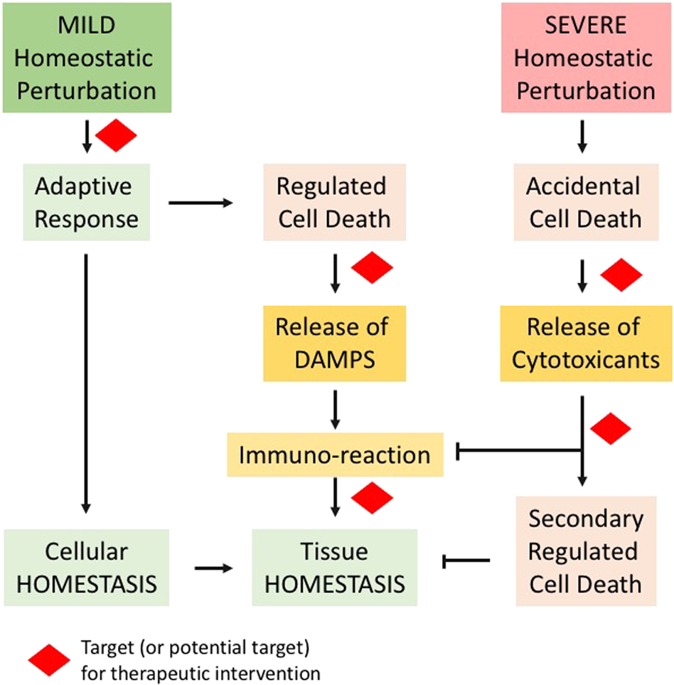当前位置:
X-MOL 学术
›
Genes. Immun.
›
论文详情
Our official English website, www.x-mol.net, welcomes your
feedback! (Note: you will need to create a separate account there.)
Cell death pathologies: targeting death pathways and the immune system for cancer therapy.
Genes and Immunity ( IF 5.0 ) Pub Date : 2018-12-19 , DOI: 10.1038/s41435-018-0052-x Francesca Pentimalli 1 , Sandro Grelli 2 , Nicola Di Daniele 2 , Gerry Melino 2, 3 , Ivano Amelio 3
Genes and Immunity ( IF 5.0 ) Pub Date : 2018-12-19 , DOI: 10.1038/s41435-018-0052-x Francesca Pentimalli 1 , Sandro Grelli 2 , Nicola Di Daniele 2 , Gerry Melino 2, 3 , Ivano Amelio 3
Affiliation

|
Alterations in the molecular mechanisms of cell death are a common feature of cancer. These alterations enable malignant cells to survive intrinsic death signalling leading to accumulation of genetic aberrations and helping them to cope with adverse conditions. Regulated cell death has historically been exclusively associated with classical apoptosis; however, increasing evidence indicates that several alternative mechanisms orchestrate multiple death pathways, such as ferroptosis, entosis, necroptosis and immunogenic cell death, each with distinct underlying molecular mechanisms. Although pharmacological targeting of cell death pathways has been the subject of intensive efforts in recent decades with a dominant focus on targeting apoptosis, the identification of these novel death pathways has opened additional venues for intervention in cancer cells and the immune system. In this mini-review, we cover some recent progress on major recently emerged cell death modalities, emphasizing their potential clinical and therapeutic implications. We also discuss the interplay between cell death and immune response, highlighting the potential of the combination of traditional anticancer therapy and immunocheckpoint blockade. While attempting to stimulate discussion and draw attention to the possible clinical impact of these more recently emerged cell death modalities, we also cover the major progress achieved in translating strategies for manipulation of apoptotic pathways into the clinic, focusing on the attempts to target the anti-apoptotic protein BCL2 and the tumour suppressor p53.
中文翻译:

细胞死亡病理:针对癌症治疗的死亡途径和免疫系统。
细胞死亡的分子机制改变是癌症的共同特征。这些改变使恶性细胞能够生存于固有的死亡信号传导中,从而导致遗传畸变的积累并帮助其应对不利条件。历史上,受调节的细胞死亡仅与经典细胞凋亡有关。然而,越来越多的证据表明,几种替代机制可以协调多种死亡途径,如铁索氏菌病,昆虫病,坏死性病和免疫原性细胞死亡,每一种都有独特的潜在分子机制。尽管在最近几十年中,细胞死亡途径的药理靶向研究一直是研究的重点,并且主要针对靶向细胞凋亡,这些新颖的死亡途径的鉴定为干预癌细胞和免疫系统开辟了更多的场所。在此小型审查中,我们介绍了最近出现的主要细胞死亡方式的一些最新进展,强调了它们潜在的临床和治疗意义。我们还讨论了细胞死亡与免疫反应之间的相互作用,强调了传统抗癌疗法和免疫检查点封锁相结合的潜力。在尝试激发讨论并引起人们对这些新近出现的细胞死亡方式的可能临床影响的关注的同时,我们还介绍了将凋亡途径的操纵策略转化为临床所取得的重大进展,重点是针对抗凋亡药物的尝试。凋亡蛋白BCL2和肿瘤抑制因子p53。
更新日期:2018-12-19
中文翻译:

细胞死亡病理:针对癌症治疗的死亡途径和免疫系统。
细胞死亡的分子机制改变是癌症的共同特征。这些改变使恶性细胞能够生存于固有的死亡信号传导中,从而导致遗传畸变的积累并帮助其应对不利条件。历史上,受调节的细胞死亡仅与经典细胞凋亡有关。然而,越来越多的证据表明,几种替代机制可以协调多种死亡途径,如铁索氏菌病,昆虫病,坏死性病和免疫原性细胞死亡,每一种都有独特的潜在分子机制。尽管在最近几十年中,细胞死亡途径的药理靶向研究一直是研究的重点,并且主要针对靶向细胞凋亡,这些新颖的死亡途径的鉴定为干预癌细胞和免疫系统开辟了更多的场所。在此小型审查中,我们介绍了最近出现的主要细胞死亡方式的一些最新进展,强调了它们潜在的临床和治疗意义。我们还讨论了细胞死亡与免疫反应之间的相互作用,强调了传统抗癌疗法和免疫检查点封锁相结合的潜力。在尝试激发讨论并引起人们对这些新近出现的细胞死亡方式的可能临床影响的关注的同时,我们还介绍了将凋亡途径的操纵策略转化为临床所取得的重大进展,重点是针对抗凋亡药物的尝试。凋亡蛋白BCL2和肿瘤抑制因子p53。











































 京公网安备 11010802027423号
京公网安备 11010802027423号